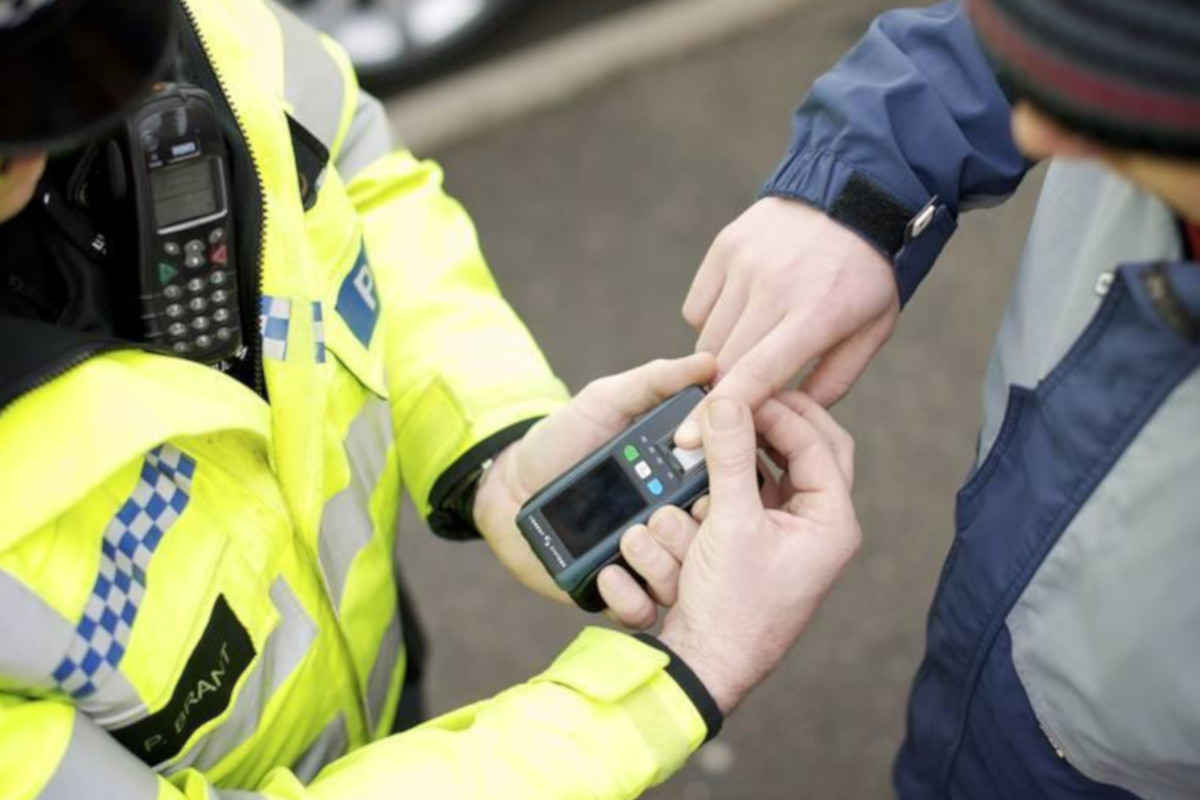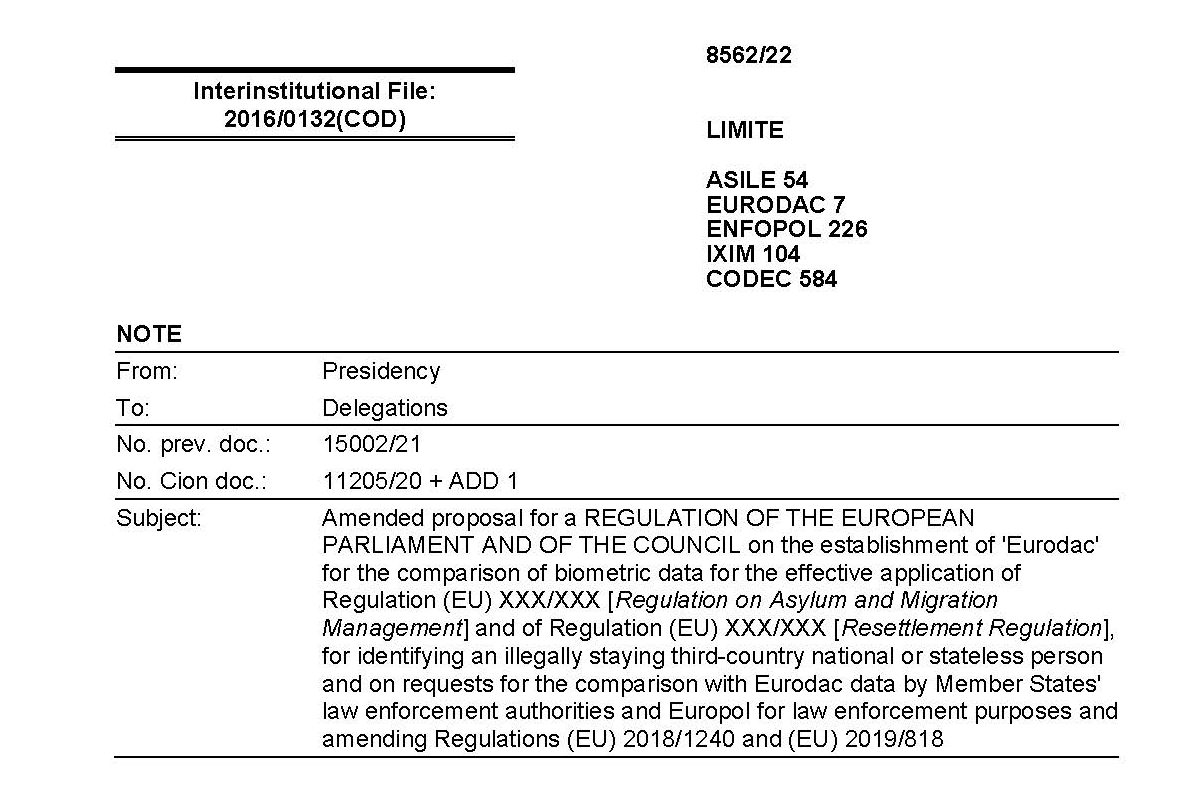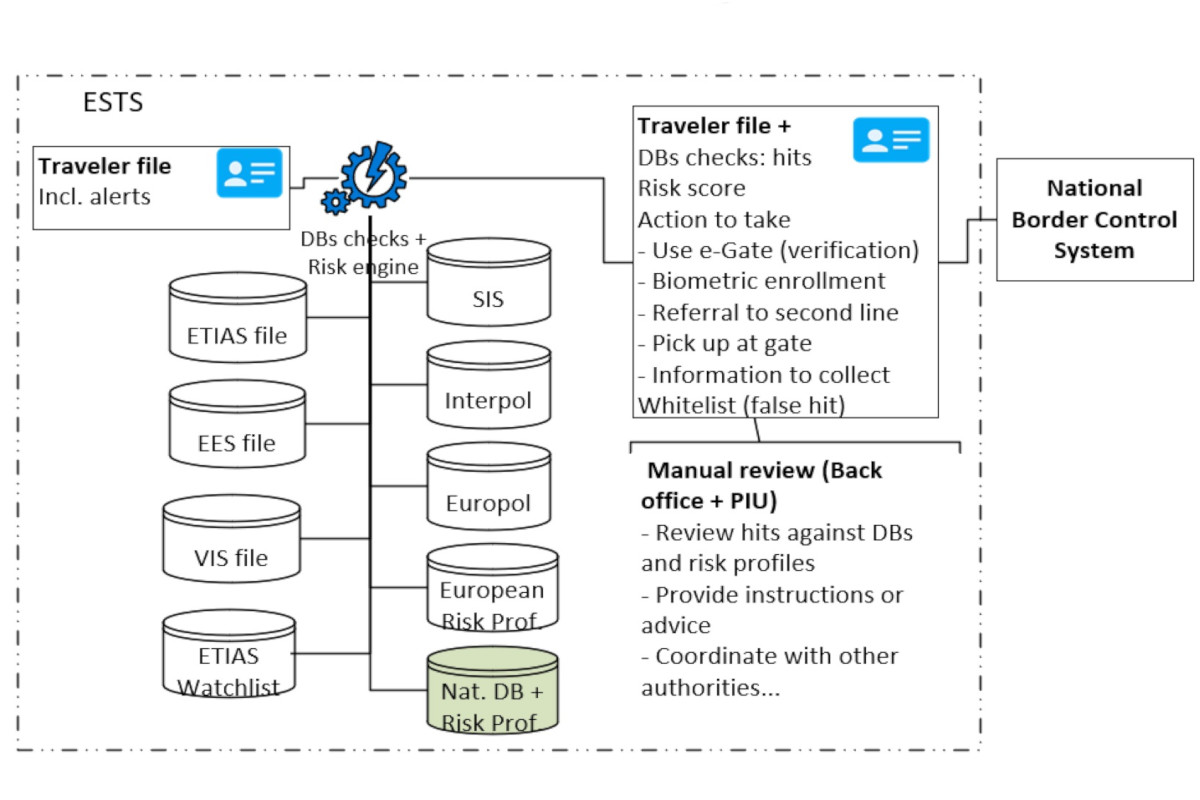EU: Council to push for “on the spot” biometric ID checks, inserting “all available data” in Schengen Information System
Topic
Country/Region
19 May 2022
The Council of the EU is set to call for “an ambitious implementation” of new rules on EU policing and immigration databases, including “on the spot” biometric ID checks with mobile fingerprint readers and face scanners; ensuring that “all available data” from national databases is added to the Schengen Information System; and enabling “full use of discreet checks, inquiry checks and specific checks,” which allow the gathering of information about targeted individuals.
Support our work: become a Friend of Statewatch from as little as £1/€1 per month.

Draft conclusions
The calls are set out in a draft set of conclusions (pdf) dealing with “the implementation of the EU information systems and their interoperability at national level,” and come after a survey of the member states revealed that half "foresee high risks" to the plan to have the biometric Entry/Exit System (EES) border crossing database up and running by the end of September this year.
The conclusions focus on the EES and another database, the Schengen Information System, which contains some 90 million alerts on people and objects used by police, immigration and judicial authorities.
Legislation establishing the EES was approved in November 2017, while revamped laws underpinning the SIS were given the green light a year later.
The forthcoming Common Identity Repository (CIR), intended to hold biometric data on hundreds of millions of foreign nationals, also features in the draft conclusions, which are not legally binding, but are intended to place political pressure on member states to take action.
Biometric identity checks
The document urges member states to ensure that they have laws in place to allow searches of the CIR using biometric data, “in particular for the purpose of facilitating the correct identification of persons,” under Article 20 of the interoperability rules.
A European Commission presentation published by Statewatch in June 2021 revealed that “many member states have not made much progress with the ‘necessary legal adaptations’ that would permit Article 20 checks,” and that less than half of participating states had completed assessments of whether changes to national legislation were needed.
A report published by Statewatch at the end of February warned that the ongoing roll-out of mobile biometric identification devices for identity checks – for example, handheld fingerprint or face scanners – was likely to entrench ethnic profiling. Aside from generic references to ensuring “a satisfactory balance between the objectives of the Regulation and the protection of fundamental rights and freedoms,” the draft conclusions contain nothing of substance on the issue.
However, they do emphasise the importance of carrying out biometric identity checks in the EES “on the spot and without delay by using relevant mobile devices, if available,” and for member states to ensure that national laws allow border and immigration authorities to conduct mobile searches with fingerprints and/or facial images.
A similar invitation is made regarding the SIS, with the version of the conclusions circulated on 6 May calling on member states:
“…to consider whether their national law allow [sic] biometric searches of the SIS to be carried out on the move for the purpose of confirming identity or for identification purposes in the context of public security missions and fighting illegal immigration, where the identity of a person cannot be established by others means”.
Identity politics
The Council’s demands come as the EU is urgently seeking to step up the number of identity checks carried out by national law enforcement and immigration agencies, with the goal of increasing deportations or intra-EU removals by detecting those deemed to have no right to stay in EU territory, or engaged in ‘secondary movements’ from one EU state to another – for example, asylum-seekers travelling from Greece to Germany.
In 2017, in the wake of the so-called refugee crisis, the European Commission issued a recommendation calling for:
“...the intensification of police checks in the entire territory of Member States, including in border areas and the carrying-out of police checks along the main transport routes such as motorways and railways....”
Proposals to reform the Schengen Borders Code that are under negotiation would increase the means available to the authorities for tracking down unwanted individuals, by permitting “the use of monitoring and surveillance technologies generally used in the territory” for identity checks.
Carrying out of such checks could also be justified for the purposes of combating “illegal migration”, says the latest text. As it stands, the law only specifically refers to “cross-border crime” in this context.
As pointed out in the Statewatch report Building the biometric state: Police powers and discrimination:
“The Commission has acknowledged that the new measures could ‘increase the risk’ of ‘racial profiling and discriminatory selection of the persons being checked with the border areas,’ but has offered no specific safeguards against this possibility, beyond those that already exist (for example, in the EU Charter of Fundamental Rights).”
“All available data”
The draft conclusions also seek to expand the Schengen Information System, stating that “the effective introduction of all available data is a prerequisite for efficient operational cooperation between Member States’ authorities.” The text calls on member states to ensure that national law allows for any data in relevant national databases to be integrated into the SIS.
At least 26 separate categories of data can be entered into SIS alerts on people. The most recent statistics on the SIS database (pdf) indicate that there were over 962,000 alerts on people held in the system at the end of 2021.
Keep it discreet
Almost 156,000 of those were Article 36 alerts, which are issued for the purpose of “discreet checks, inquiry checks or specific checks.”
In the case of discreet checks, “the subject of the alert shall in no way be made aware of the existence of the alert,” whereas inquiry checks should involve “an interview of the person, including on the basis of information or specific questions added to the alert by the issuing Member State.” Specific checks permit searches of “persons, vehicles, boats, aircraft, containers and carried objects”.
The draft conclusions seek to ensure that member states make full use of these types of checks, which seems to be a priority for the French Presidency – as highlighted by Statewatch earlier this year, “France has issued 104,760 Article 36 alerts, amounting to 66% of all individuals registered by the member states, and thus is heavily invested in maximising the function of these alerts.”
The version of the conclusions circulated on 6 May calls for “full use of discreet checks, inquiry checks and specific checks in line with… national legislation and procedures, even when the person concerned is not the subject of a national procedure”.
This is a step back from the previous version of the text, which effectively called for changes to national law – if left in place, it would have called on member states “to consider whether their national law allow [sic] to carry out specific checks even when the person concerned is not the subject of a national procedure”.
Did you find this article useful? Help us to produce more work like this: become a Friend of Statewatch
Documentation
- NOTE from: Presidency to: Delegations: Draft Council Conclusions on the implementation of the EU information systems and their interoperability at national level (Council doc. 8800/22, LIMITE, 6 May 2022, pdf)
- eu-Lisa, SIS II 2021 annual statistics (March 2022, pdf)
Further reading
- 27 April 2022: EU counter-terror shopping list: sanctions against “radical rhetoric”, intelligence agencies in asylum proceedings
- 14 April 2022: EU: Europol and the Schengen Information System: new powers to propose "information alerts"
- 22 March 2022: EU: Fine-tuning surveillance: proposal to enhance monitoring of “most dangerous” terrorists
- 28 February 2022: Building the biometric state: Police powers and discrimination
- 22 February 2022: EU: Interoperability: Letter confirms delays in implementation of “complex and challenging” plan
Image: West Midlands Police, CC BY-SA 2.0
Our work is only possible with your support.
Become a Friend of Statewatch from as little as £1/€1 per month.
Spotted an error? If you've spotted a problem with this page, just click once to let us know.

